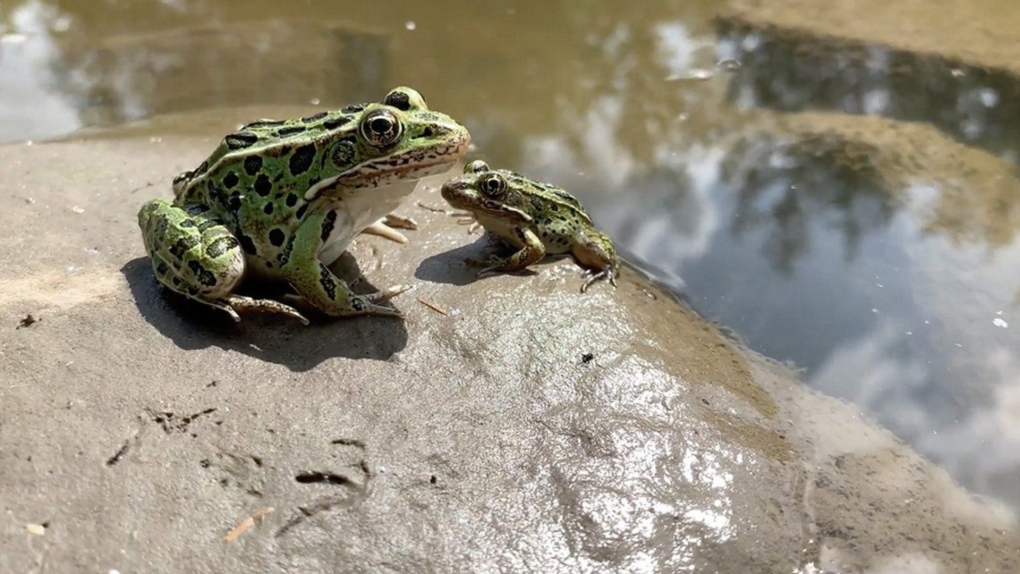Team releases endangered northern leopard frog tadpoles into B.C. wetlands
 The Wilder Institute/Calgary Zoo has been working with other conservation groups, governments and zoos to breed, translocate and release endangered northern leopard frog tadpoles into British Columbia's wetlands. The endangered northern leopard frog is shown in this undated handout photo. (THE CANADIAN PRESS/Wilder Institute/Calgary Zoo.)
The Wilder Institute/Calgary Zoo has been working with other conservation groups, governments and zoos to breed, translocate and release endangered northern leopard frog tadpoles into British Columbia's wetlands. The endangered northern leopard frog is shown in this undated handout photo. (THE CANADIAN PRESS/Wilder Institute/Calgary Zoo.)
More than 1,900 tadpoles of the endangered northern leopard frog have been released into the wild in the last few months.
The Wilder Institute/Calgary Zoo says it has been working with other conservation groups, governments and zoos to breed, translocate and release the frogs into wetlands in interior British Columbia.
The zoo says the northern leopard frog is found in three populations in Canada — in the east, the western boreal and prairies, and in the Rocky Mountains.
The Rocky Mountain population, which is found in B.C., is endangered.
The frog plays an important role in its ecosystem, where it transfers nutrients between the land and water.
The Calgary zoo, which is part of the British Columbia northern leopard frog recovery team, has hosted breeding programs for the frogs in the past and will be monitoring the recently released frogs to see how they are adjusting to their new home.
This report by The Canadian Press was first published Aug. 18, 2022.
CTVNews.ca Top Stories

B.C. tenants evicted for landlord's use after refusing large rent increase to take over neighbouring suite
Ashley Dickey and her mother rented part of the same Coquitlam duplex in three different decades under three different landlords.
Mountain guide dies after falling into a crevasse in Banff National Park
A man who fell into a crevasse while leading a backcountry ski group deep in the Canadian Rockies has died.
Expert warns of food consumption habits amid rising prices
A new survey by Dalhousie University's Agri-Food Analytics Lab asked Canadians about their food consumption habits amid rising prices.
MPP Sarah Jama asked to leave Ontario legislature for wearing keffiyeh
MPP Sarah Jama was asked to leave the Legislative Assembly of Ontario by House Speaker Ted Arnott on Thursday for wearing a keffiyeh, a garment which has been banned at Queen’s Park.
Charlie Woods, son of Tiger, shoots 81 in U.S. Open qualifier
Charlie Woods failed to advance in a U.S. Open local qualifying event Thursday, shooting a 9-over 81 at Legacy Golf & Tennis Club.
Ex-tabloid publisher testifies he scooped up possibly damaging tales to shield his old friend Trump
As Donald Trump was running for president in 2016, his old friend at the National Enquirer was scooping up potentially damaging stories about the candidate and paying out tens of thousands of dollars to keep them from the public eye.
Here's why provinces aren't following Saskatchewan's lead on the carbon tax home heating fight
After Prime Minister Justin Trudeau said the federal government would still send Canada Carbon Rebate cheques to Saskatchewan residents, despite Saskatchewan Premier Scott Moe's decision to stop collecting the carbon tax on natural gas or home heating, questions were raised about whether other provinces would follow suit. CTV News reached out across the country and here's what we found out.
Montreal actress calls Weinstein ruling 'discouraging' but not surprising
A Montreal actress, who has previously detailed incidents she had with disgraced Hollywood producer Harvey Weinstein, says a New York Court of Appeals decision overturning his 2020 rape conviction is 'discouraging' but not surprising.
Caleb Williams, Jayden Daniels and Drake Maye make it four NFL drafts with quarterbacks going 1-3
Caleb Williams is heading to the Windy City, aiming to become the franchise quarterback Chicago has sought for decades.
































